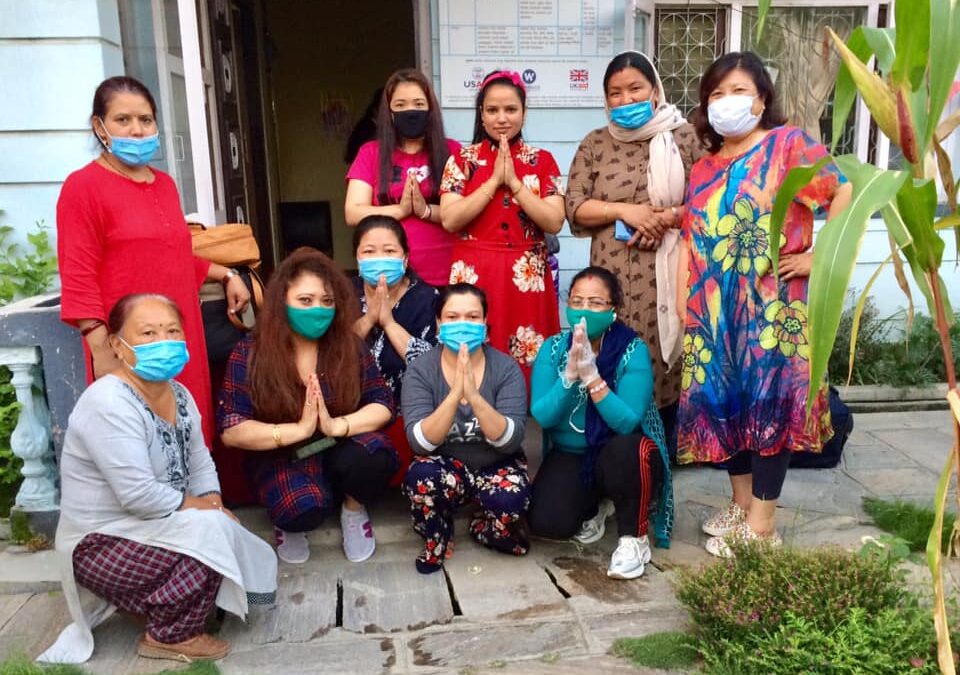
Dec 3, 2020
Globally, marginalized workers have been especially hard hit by the novel coronavirus. Migrant workers in particular have experienced some of the harshest effects of COVID-19 and the related lockdowns, quarantines and travel restrictions.
Yet while the world has recognized “the bravery of frontline workers,” many of whom are migrants, “we must now turn that celebration into something that is meaningful and not just ephemeral,” says United Nations Secretary-General António Guterres.
We must ensure “fair and ethical recruitment, decent work, and access to health care and social protection without discrimination. It is also critical we promote financial inclusion of migrants and their families. We must address discrimination … migrants must not be stigmatized or denied access to medical treatment and other public services.”
Guterres spoke during release of the first UN Secretary General’s report on the Global Compact for Safe, Orderly and Regular Migration. Adopted in December 2018, the Global Compact sets out a cooperative framework for achieving safe, orderly and regular migration within a rights-based framework, and includes a process for implementation and review.
The report, part of the UN review process, focuses extensively on the effects of COVID-19 on the world’s 272 million migrants and the guidance the Global Compact offers in addressing the adverse effects on migrant workers.
Fewer Protections for Migrant Workers Under COVID-19
As borders and worksites were shut early this year, millions of migrant workers were stranded around the world, many trapped in crowded housing with no access to support, including access to food and other life-sustaining provisions. Many migrant workers were systematically denied social safety net protections like unemployment benefits or other forms of income support.
Others were forced to work in unsafe conditions, suffered from wage theft, and retaliation for speaking out about abuse. Origin countries frequently lack adequate health infrastructure, exposing those who returned to a greater risk of contracting COVID-19, or making it difficult for those who were infected to find care. Migrants returning in these conditions are also particularly vulnerable to exploitation, violence, stigma, discrimination and, without jobs, may be unable to support themselves or their families.
Although some governments took positive steps to voluntarily return migrant workers, according to the Global Compact report, many imposed even harsher restrictions. “The pandemic has been used by some [countries] to justify the increased and discriminatory use of immigration detention and to deport migrants without due process,” the report said.
The COVID-19 crisis also has worsened the situation for migrants in countries where they work. In Central Asia, the COVID-19 pandemic “exposed structural and institutional flaws in the way migration is managed in the region,” making conditions for migrant workers dire, according to a shadow report on implementation of the Global Compact in the Central Asian region. The shadow report cites such structural flaws as lack of work contracts that result in wage theft, no regulation of work hours and little or no access to health care or other social and legal protections. It was submitted to the UN by the Solidarity Center, the International Labor Initiatives (ILI), Insan Leilek and the Kazakhstan International Bureau for Human Rights.
The pandemic is especially hard on women, including the 8.5 million migrant women in domestic work, as well as lesbian, gay, bisexual, transgender and intersex migrants, the Global Compact report finds. Even as domestic violence is increasing during the pandemic, resources are being redirected away from sexual and reproductive health services. The Global Compact report points to the need for a gender-responsive, rights-based approach to migration all the more necessary.
Remove Barriers that Repress Migrant Workers’ Full Potential
Rooted in the UN Declaration of Human Rights and internationally agreed standards and frameworks, the Global Compact is grounded in rights-based policies and is a “call to build comprehensive, rights-based policies to ensure that migrants and their communities can thrive,” according to the report.
As such, “legislation should provide for ensuring the rights of migrants in accordance with international human rights standards, including fair and safe working conditions, the right to good rest, the right to access jobs without discriminatory procedures for obtaining the right to work,” according to a shadow report from Russian unions to the UN. “We believe that receiving countries should provide regulatory and visa flexibility for workers, especially during a pandemic.”
Noting the urgency for greater cooperation across borders during the COVID-19 crisis, including the integration of public health concerns into rights-based border governance, the Global Compact report recommends that member countries implement measures and practices in response to COVID-19 that ensure an inclusive public health response to suppress the virus and restart economies, protect migrants’ human rights and ensure the availability of lifesaving humanitarian assistance.
The report’s recommendations support the UN’s June 2020 Policy Brief: COVID-19 and People on the Move, which states that “the best way to recognize the important contribution made by people on the move to our societies during this crisis is to remove barriers that inhibit their full potential.
“This means facilitating the recognition and accreditation of their qualifications, exploring various models of regularization pathways for migrants in irregular situations and reducing transaction costs for remittances.”
Ultimately, as the report states: “The COVID-19 crisis presents an opportunity to reimagine human mobility for the benefit of all while advancing the central commitment of the 2030 Agenda to leave no one behind.” The report is in line with calls from the global labor movement, led by the International Trade Union Confederation, for a new social contract “between workers, government and business, which should include a floor of a universal labor guarantee for all workers.
“Implementing a New Social Contract would make sure that that rights are respected, jobs are decent with minimum living wages and collective bargaining, social protection is universal, due diligence and accountability are driving business operations, and that social dialogue ensures just transition measures for climate and technology.”
In short: A new social contract must include all workers, including migrants.
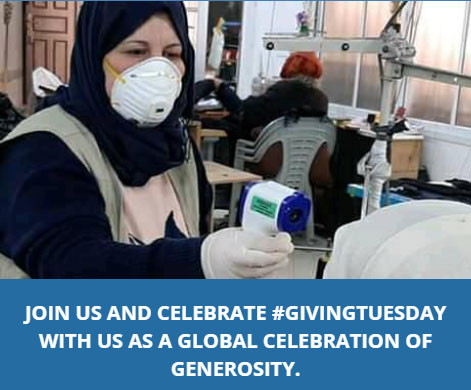
Dec 1, 2020
When the pandemic hit, the Solidarity Center quickly pivoted its programming, drawing on its extensive network in more than 60 countries to rapidly respond to the unprecedented COVID-19 crisis.
- In Kenya, Solidarity Center joined with the Central Organization of Trade Unions (COTU-K) to protect market vendors and reduce community spread of COVID-19 by providing infection control supplies for distribution through worker organizations representing nearly 6,000 informal workers.
- With the Kuwait Trade Union Federation (KTUF), the Solidarity Center connected with migrant worker associations to distribute 100,000 COVID-19 information brochures to 3 million migrant workers in Bengali, French, Hindi, Sinhala Tagalog and addressed unpaid wages and unsafe living arrangements by working with the government officials to solve urgent issues.
- Partners in the Solidarity Center Workers Empowerment and Participation program in Bangladesh distributed 30,000 COVID-19 awareness leaflets to community members and helped reduce rent for garment workers laid off due to COVID-19.
“Whether we were creating innovative organizing ideas or rapidly mobilizing resources for local campaigns and for the sheer survival of unions during this crucial period, we stood strong by our commitment to protect workers and their rights worldwide and strengthen solidarity with our union partners during this time of crushing layoffs and economic devastation,” says Solidarity Center Executive Director Shawna Bader-Blau.
Today, #GivingTuesday, the Solidarity Center is raising $25,000 to support grassroots programs worldwide.
Will you join us to go above and beyond in order to meet this goal? Any gift you make, regardless of the amount, will make a difference through our work.
#GivingTuesday is a day to stand up for what you believe in. It is a day to stand in solidarity with workers and the Solidarity Center’s more than 500 unions and worker rights partners around the world. It’s a day to demonstrate that you care.
“Resilience is part of who we are and always have been,” says Bader-Blau. “Our union partners and workers worldwide have faced unimaginable hardships but have demonstrated perseverance and innovation in many new ways. And we are standing right there with them.”
Donate now!
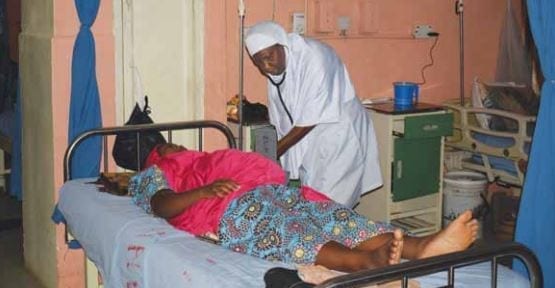
Oct 15, 2020
A new survey of 700 health workers in six West African countries—Gambia, Ghana, Nigeria, Senegal, Sierra Leone and Togo—provides a window into health-sector shortcomings that are compounding the region’s ability to respond effectively to the COVID-19 crisis. The survey, conducted by the Organization of Trade Unions of West Africa (OTUWA) together with national trade union centers and healthcare unions, was released last week together with a raft of union recommendations for ensuring the protection of health worker rights and effective, accessible healthcare for all.
“The results of OTUWA’s health care worker survey are very important for the decision-makers in this region, especially in the midst of a pandemic,” said OTUWA President and National Union of Autonomous Trade Unions of Senegal (UNSAS) General Secretary Mademba Sock.
The survey found that most health workers are being subjected to increased workload without additional compensation and feel unsafe at work due to shortages of personal protective equipment and inadequate access to COVID-19 tests. Respondents indicated insufficient health facilities, shortage of medical personnel and unaffordable medical care as their most pressing issues.
OTUWA, which represents trade union national centers in the 15 West African countries comprising the Economic Community of West African States (ECOWAS), will promote the survey’s findings and policy recommendations within regional organizations such as ECOWAS and the West African Health Organization (WAHO). OTUWA will also support affiliates as they engage their own governments on issues that negatively affect healthcare workers and prevent universal access to good health care.
“The survey findings underscore the fact that workers and unions must be involved in all discussions and decisions about health care systems in our region, so they properly serve everyone’s needs,” said OTUWA Secretary General John Odah, who is urging governments in the region to prioritize and increase budgetary spending on health facilities and supplies.
The survey report was released during an OTUWA-led virtual presentation on October 8, during which Kwasi Adu-Amankwah, International Trade Union Confederation (ITUC)-Africa general secretary, and David Dorkenoo, International Labor Organization (ILO) Bureau for Workers Activities (ACTRAV) specialist for Ghana, Liberia and Sierra Leone, underlined the survey’s importance for policymakers. Other participating organizations in the event included the Organization of African Trade Union Unity (OATUU); Benin, Gambia, Ghana, Mali, Nigeria and Senegal national union centers; and several healthcare unions.
“We are brothers and sisters across these countries, and we have learned a lot from the pandemic,” said West Africa Health Sector Unions’ Network (WAHSUN) Chair Perpetual Ofori-Ampofo, during the event.
At Ofori-Ampofo’s suggestion, event participants agreed that union representatives discussing healthcare issues with their governments should emphasize the urgency of ratifying International Labor Organization (ILO) Convention 190. C190 is the world’s first treaty requiring governments to address gender-based violence and harassment in the world of work, which Ofori-Ampofo said is commonly reported by health workers in the region.
The survey is an activity of OTUWA’s new “Healthcare Is a Human Right” campaign. Launched in Abuja in March, the campaign unites OTUWA affiliates in a fight for equal and fair healthcare access for all who live within the ECOWAS region.
The survey report is also available in French.
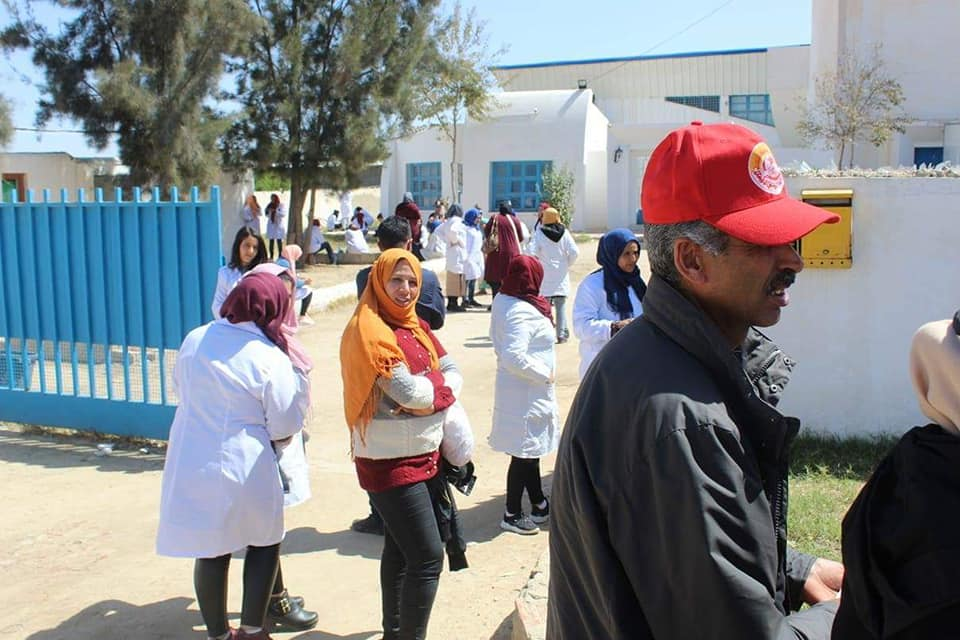
Sep 9, 2020
The Tunisian General Labor Union (UGTT) is calling on employers and the government to join with it in addressing the severe challenges textile workers are facing during the COVID-19 crisis and negotiate an action plan to guide the struggling garment sector.
Some 160,000 workers, the vast majority of whom are women younger than age 35, work in Tunisia’s textile industry, which accounts for 34 percent of the country’s manufacturing sector. Following the country’s coronavirus lockdown, workers lost jobs and pay, in part because the industry experienced a 45.2 percent decline in textile exports in March from the previous year, according to the National Institute of Statistics in Tunisia. Many corporate brands also canceled “mid-season” orders.
But crucially, employers also took advantage of the COVID-19 crisis to cease or suspended paying workers’ social security benefits or family allowances, such as food tickets, under the pretext of force majeure, union leaders say. Employers coerced workers, especially new employees, into signing fixed-term contracts and giving up their status as permanent workers. Workers also say some employers blocked their efforts to form unions to gain fundamental rights on the job, closed union offices—prohibiting workers from meeting in the office even outside working hours—and removed posters and other legally placed union material from worksites.
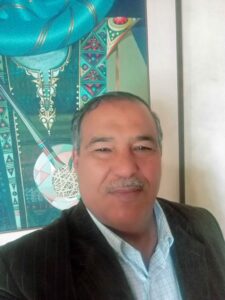
Habib Al-Hazami. Credit: General Federation of Textile Leather and Footwear
“All trade union activists and the General Federation affirm that the garment and textile sector in Tunisia has been marginalized and is facing a crisis,” says Habib Al-Hazami, general secretary of the General Federation of Textile, Leather, and Footwear.
In April, the Tunisian General Labor Union (UGTT) and the Tunisian Federation for Industry and Trade entered into a landmark agreement on workers’ wages, including textile workers’ wages. The government agreed to contribute $73 per worker, with the remaining salary paid by employer. Employers also agreed to register unregistered workers with the National Social Security Fund within a month after the agreement to ensure they are eligible for social benefits.
Although the lockdown ended June 27 and many factories resumed nearly full production, union leaders say worker rights’ violations persist, with factories not following government regulations to slow the spread of the novel coronavirus.
In calling for discussions with employers and the government, UGTT is seeking to:
- Strengthen job security for garment and textile workers by reducing short-term contracts and increasing formal employment.
- Examine how best to restructure the sector with a focus on ethical market competition so workers do not bear the brunt of corporate brands’ rush for products at the lowest cost.
- Take urgent steps to end gender-based violence and harassment at work and ensure decent working conditions.
- Increase workplace inspections to monitor potential safety and health violations.
- Create space for workers to form and join unions so they have a voice on the job.

Aug 14, 2020
In the wake of the COVID-19 pandemic, millions of migrant workers have been forced to return to their homes or are languishing in their destination countries without jobs, and Nepali migrant workers are no exception.
In 2019, Nepal’s Department of Foreign Employment issued 236,208 labor permits for migrant workers, 8.5 percent of which were issued to women. As the pandemic spread, work in major destination countries for Nepali workers in Kuwait, Malaysia, Qatar, Saudi Arabia and the United Arab Emirates also came to a halt. Sudden job loss and pay cuts pushed migrant workers into precarious positions. The government’s decision to cancel all international flights to contain the spread of the virus added to their stress and uncertainty. The nationwide lockdown began March 24.
After more than two months, the Nepal government’s repatriation plan came into force. The government arranged to hold returning migrant workers in quarantine centers in Kathmandu until their respective provinces arranged departure to their home districts. On the first repatriation flight, 306 women, all previously working as domestic workers and granted amnesty by the Kuwaiti government, landed in Nepal in June.
Bijaya Rai Shrestha, founder and chairperson of Aaprabasi Mahila Kamdar Samuha (Returnee Migrant Women Workers Group, AMKAS) in Nepal, knew she had to help. “I could hear my inner self telling me that I have to step up to do my part to support these sisters,” she says. The first flight from Kuwait landed while AMKAS was navigating the procedures and formalities to get authorization to host returnees at its shelter. After 12 hours, they received approval—and later that evening, they were notified 10 women were headed their way. The shelter has capacity for 15 women following quarantine procedures.
Reaching Migrant Workers and Relating to Their Pain
AMKAS—created, led by, and working for migrant workers to make migration safe and dignified—advocates for the rights of migrant women workers and provides them with a variety of services. It is a Solidarity Center partner.
“On the first day, around 8 p.m., I received the message that 10 sisters from Kuwait would be brought to our shelter. I had no clue that they would come that late. My team had already gone home. I could no way to request that they postpone bringing the sisters the following morning. I still remember in my quivering voice I said, ‘Yes, please bring them!’” she says. That night, Bijaya booked a hotel near the shelter so the women had a place for the evening. They came to the shelter the following day. Despite insufficient resources to support the influx of women, Bijaya says the humanitarian need outweighed the obstacles.
Complicating the return and reintegration of the workers is the stigmatization that they might be virus carriers. Her landlord wanted her to move operations. He sent the police, then the Nepal Army, but their paperwork was in order. The soldiers, she says, “thanked us for the work that we are doing and requested the neighbors to extend their cooperation to us.”
AMKAS has successfully hosted 109 women in different groups. The organization books other returning women into a hotel near the shelter.
I was also a migrant worker,” Bijaya recalls. “From the beginning of the pandemic, I could relate to the pain that thousands of women were going through. She adds, almost all women who we hosted were not paid for up to six months. Returnees must cover the cost of travel to their home district.
Chandra Maya BK, a returnee migrant from Kuwait says, “I do not have the 1,500 rupees (approximately $13) to return to my home district. This explains how much I wish to get my six months pay that is due. At the shelter, I learned that the government has some loan provisions and legal aid facilities for us. Help me get my pay, I can start something on my own.”
At present, the shelter is at capacity with returned workers waiting out their 15-day quarantine [and test results]. The organization also serves other returned migrant workers for whom AMAKS helped find positions but who are also jobless because of the pandemic.
“We couldn’t leave them to survive on their own,” says Bijaya. “Masks are in need, so we managed to provide 30 returned workers with virtual mask-making training. After the training during those strict lockdown days, we delivered sewing machines along with the raw materials to all of them,” she says. The women are making masks and AMKAS is helping them sell them online.
AMKAS is planning an awareness program covering various aspects of the government’s reintegration provisions, legal aid, migration cycle and trafficking at the shelter and also at the community level, with support from the Solidarity Center.





